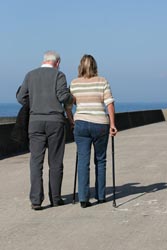Frailty and falling in the elderly
Frailty has to be one of the archenemies of the ageing population. Not only does it cause injury and possible confinement in hospital, it threatens the independence of old people who may otherwise be healthy. The European project BETTER-AGEING investigated the factors involved in physical frailty and training programmes that may counteract this degeneration. Scientists at King's College London specifically researched muscle weakness in healthy young and old people as well as an age-matched group of older people who fell for medically unexplained reasons. Using techniques including ultrasonography, variables such as maximal voluntary strength and activation, leg extension power output, steadiness and asymmetry of strength were measured. The relationship between number of falls and the different measures of strength could then be calculated. There was found to be a strong correlation between frequency of falls and reduction in power. Interestingly, asymmetry of power did not predispose the elderly to falling. Furthermore, the group of age-matched fallers demonstrated more degeneration than would be expected for their chronological age. As a preventative strategy, training and exercise programmes would seem an appropriate measure that could be implemented by physiotherapists and trained care workers. The scientists discovered that elderly fallers and non-fallers showed a similar response to a one-year training programme. This resulted in an overall increase of strength in various muscle groups. As an alternative, a trial involving the gentle workout of the martial art Ti Chi proved potentially beneficial for confidence and was found to promote the habit of exercise. The findings of this study have been disseminated through a series of working groups that include the medical profession, health authorities and age-related charities. Training programmes that would prevent or reduce falling could be included in a scheme that would stop the instigation of a vicious circle of frailty and falling. This would then provide a significant contribution to the achievement of the European goal of healthy ageing within the population.







